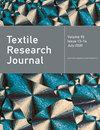整合人工智能,实现最佳热舒适度:符合用户偏好的电热织物设计方法
IF 1.9
4区 工程技术
Q2 MATERIALS SCIENCE, TEXTILES
引用次数: 0
摘要
人的热舒适度对身心健康和工作效率至关重要,而个人舒适系统通常能改善热舒适度,在提高能效的同时,还能对环境条件进行量身定制的控制。以往的研究已经根据用户的喜好探索了体温调节系统中的各种纺织技术。然而,通过人工智能进行温度预测以最大限度地提高不同用户的热舒适度的研究还很有限。本研究提出了一种利用人工智能优化电热纺织品热舒适度的设计方法,其中考虑到了与年龄和性别差异相关的用户偏好。首先建立了一个模糊逻辑模型,作为通过改变环境温度来调节温度的概念验证,然后开发了一个人工神经网络模型来预测最佳温度,以获得最大的舒适度。随后,制作了一件智能电热夹克,以评估 50 名不同年龄和性别的受试者偏好的加热温度。人工神经网络模型的结果表明,温度预测效果良好,而受试者的测试结果显示,不同性别的皮肤温度差异显著。这强调了对基于人工智能的加热电子织物的需求,以满足不同用户的需求。这项研究的结果有望促进发热纺织品和可穿戴设备的智能温度调节,通过定制加热产品使行业和消费者受益。本文章由计算机程序翻译,如有差异,请以英文原文为准。
Integrating artificial intelligence for optimal thermal comfort: A design approach for electric heating textiles aligned with user preferences
Human thermal comfort, crucial for well-being and productivity, is often improved by personal comfort systems that offer tailored control over environmental conditions while promoting energy efficiency. Previous studies have explored various textile technologies in thermoregulation systems according to user preferences. However, limited research has focused on temperature prediction by artificial intelligence to maximize thermal comfort for varied users. This study proposes a design approach to optimize thermal comfort in electric heating textiles using artificial intelligence, considering user preferences related to age and gender differences. A fuzzy logic model is established as a proof of concept for temperature regulation by varying ambient temperature, followed by developing an artificial neural network model to predict the optimal temperature for maximum comfort. Subsequently, a smart electric heating jacket is fabricated to assess preferred heating temperatures among 50 subjects with varying ages and genders. Results from the artificial neural network model show promising temperature prediction, while subject tests reveal significant differences in skin temperatures based on gender. This emphasizes the need for artificial intelligence-based heating e-textiles to accommodate diverse user needs. The study’s findings are expected to contribute to intelligent temperature regulation in thermal textiles and wearables, benefitting both the industry and consumers through customized heating products.
求助全文
通过发布文献求助,成功后即可免费获取论文全文。
去求助
来源期刊

Textile Research Journal
工程技术-材料科学:纺织
CiteScore
4.00
自引率
21.70%
发文量
309
审稿时长
1.5 months
期刊介绍:
The Textile Research Journal is the leading peer reviewed Journal for textile research. It is devoted to the dissemination of fundamental, theoretical and applied scientific knowledge in materials, chemistry, manufacture and system sciences related to fibers, fibrous assemblies and textiles. The Journal serves authors and subscribers worldwide, and it is selective in accepting contributions on the basis of merit, novelty and originality.
 求助内容:
求助内容: 应助结果提醒方式:
应助结果提醒方式:


